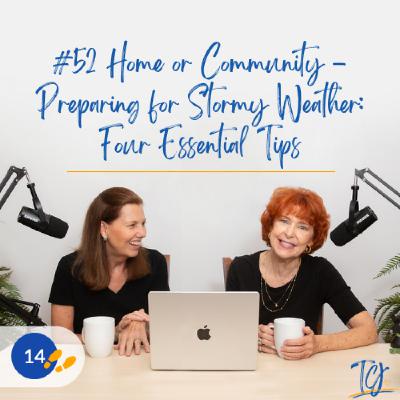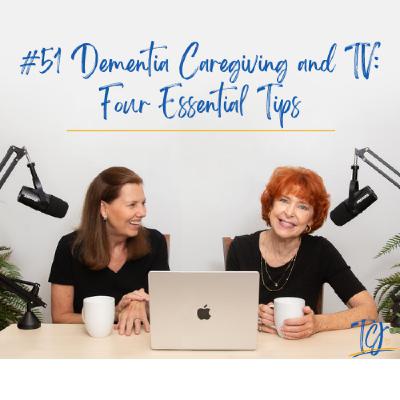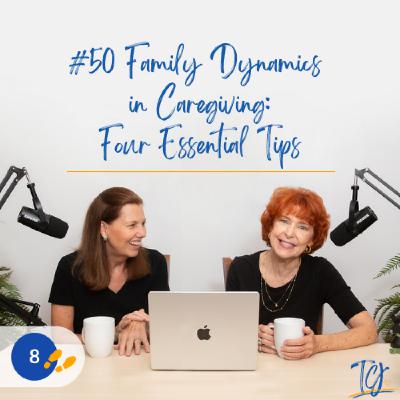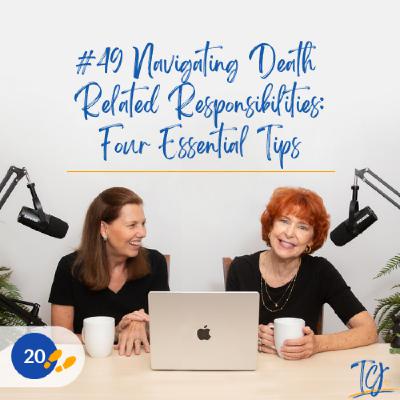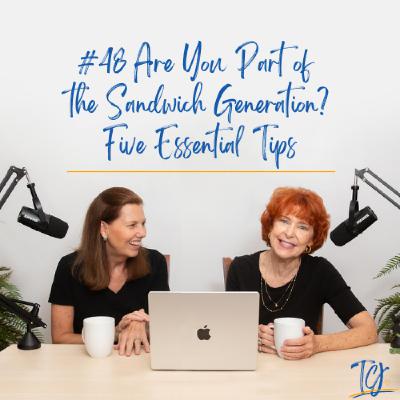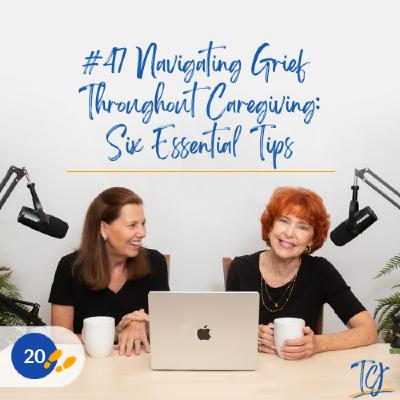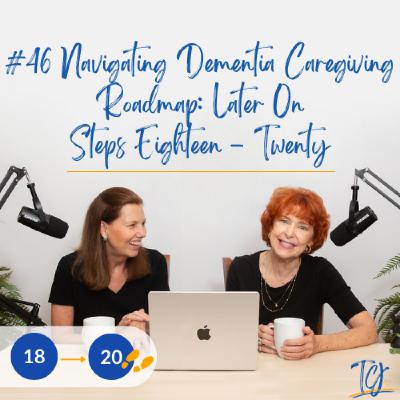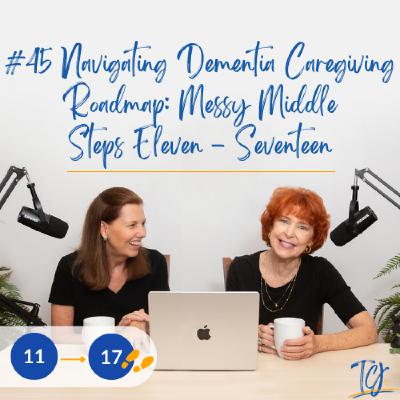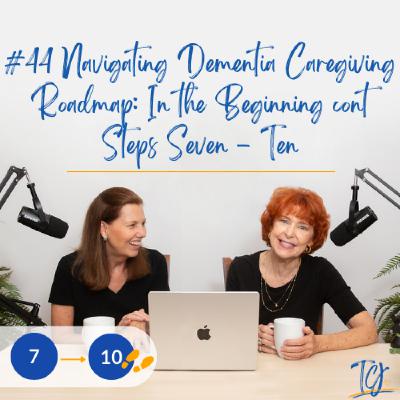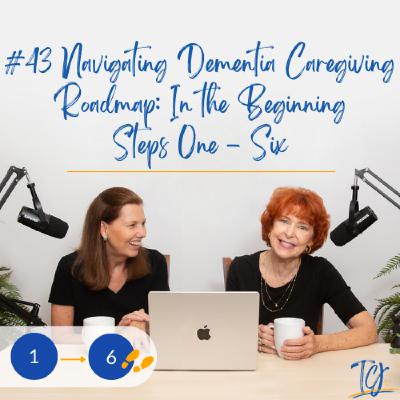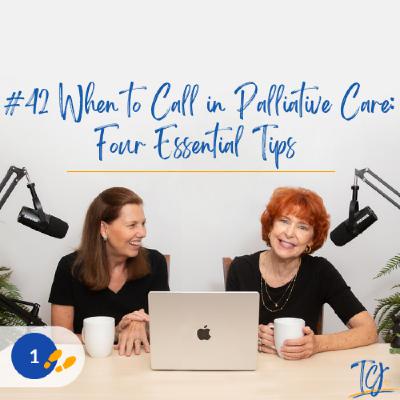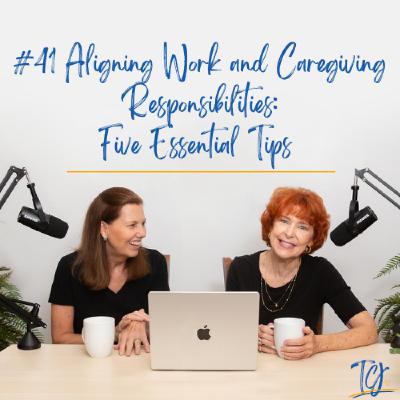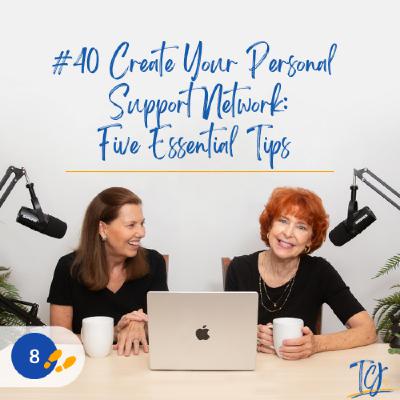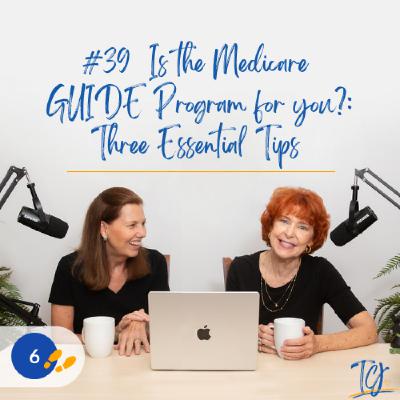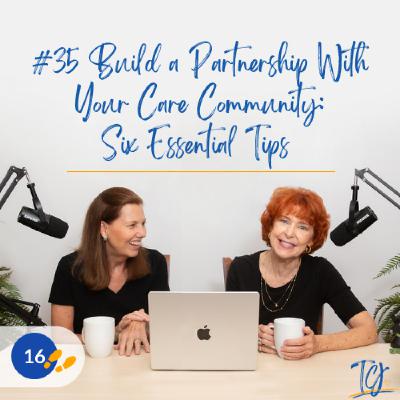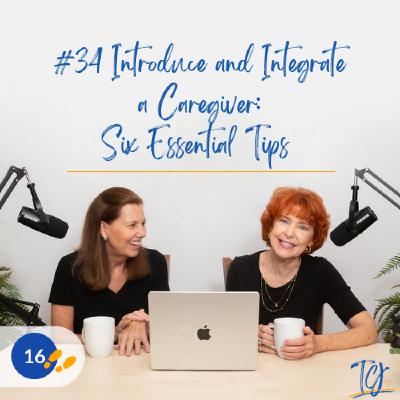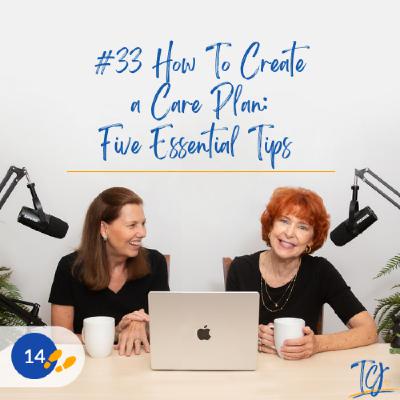Discover The Caregiver's Journey
The Caregiver's Journey

The Caregiver's Journey
Author: Sue Ryan and Nancy Treaster
Subscribed: 138Played: 282Subscribe
Share
© 2023 Sue Ryan Solutions
Description
The Caregiver’s Journey podcast is an innovative and refreshing way to learn how to tackle day-to-day Alzheimer's and dementia family caregiving challenges with strength, patience, and peace of mind. Using practical tips and candid conversations, Sue Ryan and Nancy Treaster help you navigate caregiving’s ups and downs, so you move from feeling frustrated, overwhelmed, and sometimes frightened - to confident, balanced, and supported.
54 Episodes
Reverse
Are you prepared if a major storm threatens your area? Do you know whether to evacuate or shelter in place with your loved one who has dementia? Have you created a communication plan that accounts for potential power outages and cell tower failures?
We are Sue Ryan and Nancy Treaster. As caregivers for our loved ones with Alzheimer's and other types of dementia, we understand how storm season brings critical decisions that require advance planning. Whether your loved one lives at home or in a care community, preparing for storms demands special considerations for people living with dementia.
Recently, we spoke with Celeste Lynch, Executive Director at Moorings Park Grand Lake in Naples, Florida. With nearly 40 years of experience in senior living leadership, emergency planning, and resident safety, Celeste shared invaluable insights on storm preparedness from both the care community and at-home perspectives.
If you're following along with the Navigating Dementia Caregiving Roadmap Guide, today's topic aligns with Step 14: Create a Care Plan and Family Emergency Plan.
Let's explore four essential tips for weathering storms safely with your loved one who has dementia.
Connect with us and share your tips:
Website: https://thecaregiversjourney.org/Donate: https://give.cornerstone.cc/thecaregiversjourneyInstagram: https://www.instagram.com/thecaregiversjourney/Facebook: https://www.facebook.com/thecaregiversjourneys/Linkedin: https://www.linkedin.com/in/suearmstrongryan/, https://www.linkedin.com/in/nancytreaster/Email: sue@thecaregiversjourney.org, nancy@thecaregiversjourney.org
Full Show Notes
https://thecaregiversjourney.org/52-preparing-for-stormy-weather-four-essential-tips-alzheimers-and-other-dementias/
Additional Resources Mentioned
Navigating Dementia Caregiving Roadmap guide: https://thecaregiversjourney.org/guides/Moorings Park community: https://www.mooringspark.org/ FEMA assistance programs: https://www.fema.gov/DisasterAssistance.gov: https://www.disasterassistance.gov/Relief organizations such as the Red Cross: https://www.redcross.org/Support the nonprofit The Caregiver's Journey: https://give.cornerstone.cc/thecaregiversjourney
Takeaways
We shared 4 tips:
Preparing Ahead of Time Decide whether you will shelter in place or evacuateStrengthen Your Communication Plan Before, During, and After the Storm Post storm, safely get them back in their routine
Read More in This Blog here
"The difference between TV as comfort and TV as chaos isn't the screen—it's understanding how the changing brain experiences what's on it."
Do you rely on television to help occupy your loved one's time? Does your care receiver seem agitated or anxious when the TV is on? Have you noticed them leaving the room when a show is playing or struggling to follow programs they once enjoyed?
We are Sue Ryan and Nancy Treaster. As caregivers for our loved ones with Alzheimer's and other types of dementia, we've learned that what soothes us as caregivers can actually cause distress for people living with dementia. In this episode, we spoke with Allyson Schrier, co-founder and president of Zinnia TV and former caregiver for her husband with frontotemporal dementia, about why regular TV can be problematic and what we can do about it.
Let's explore four essential tips for managing TV time effectively.
Connect with us and share your tips:
Website: https://thecaregiversjourney.org/Donate: https://give.cornerstone.cc/thecaregiversjourneyInstagram: https://www.instagram.com/thecaregiversjourney/Facebook: https://www.facebook.com/thecaregiversjourneys/Linkedin: https://www.linkedin.com/in/suearmstrongryan/, https://www.linkedin.com/in/nancytreaster/Email: sue@thecaregiversjourney.org, nancy@thecaregiversjourney.org
Full Show Notes
Additional Resources Mentioned
Zinnia TV https://www.zinniatv.comSupport the nonprofit The Caregiver's Journey: https://give.cornerstone.cc/thecaregiversjourney
Takeaways
Tip 1: Be Thoughtful About What’s On TV
The answer isn’t to take TV away completely. We need to be thoughtful about what we put on the TV and pay close attention to how our loved ones respond.
Tip 2: Target Something That Creates Curiosity Without Agitation
The goal is to find programming that engages without overstimulating or causing your loved one to fall asleep (because daytime sleeping can lead to nighttime wakefulness).
Tip 3: Leverage Simulated Presence Therapy
The innovative approach of simulated presence therapy takes advantage of how people with dementia can experience confusion between what’s on screen and what’s actually happening — and uses it to benefit them.
What is simulated presence therapy? Research has shown that when someone will only take medication or follow instructions from a specific person (like a daughter or doctor), showing them a video of that person giving the instruction can work just as effectively as having the person physically present.
Tip 4: Create Engaging Alternatives On Your Own
Beyond television, there are creative ways to provide visual engagement that work better with how the dementia brain processes information.
Observe and Adjust
Managing the television experience for someone with dementia isn’t about finding one perfect solution. What works today may not work next month as the disease progresses, and that’s reasonable. The process is about observing how your loved one responds and adjusting accordingly.
The key is understanding the changing brain experiences television very differently than we do. Through being thoughtful about what’s on the screen, targeting content that engages without overwhelming, leveraging simulated presence therapy, and creating our own alternatives, we can turn TV time from a potential source of agitation into a positive opportunity for comfort and connection.
Read More in This Blog here
Are you struggling to pull your family together to create a working support system for someone living with dementia? Do you find family members disagreeing on what needs to be done or how to help? You're not alone, and there's a path forward.
We are Sue Ryan and Nancy Treaster. As caregivers for our loved ones with Alzheimer's and other types of dementia, we've learned that transforming family dynamics into effective teamwork is one of the most challenging—yet most rewarding—aspects of the caregiving journey.
In this episode, we spoke with Dr. Barry Jacobs, a clinical psychologist and family therapist who brings both professional expertise and personal caregiving experience to this conversation. Barry cared for his mother with vascular dementia and his stepfather with Alzheimer's disease for seven years, and he co-authored the AARP Caregiver Answer Book with his wife, psychologist Julia Mayer.
This content aligns with Step 8 of our Navigating Dementia Caregiving Roadmap: Start Planning for the Next Stage of Care, particularly when building your personal support network of family and friends.
Connect with us and share your tips:
Website: https://thecaregiversjourney.org/Donate: https://give.cornerstone.cc/thecaregiversjourneyInstagram: https://www.instagram.com/thecaregiversjourney/Facebook: https://www.facebook.com/thecaregiversjourneys/Linkedin: https://www.linkedin.com/in/suearmstrongryan/, https://www.linkedin.com/in/nancytreaster/Email: sue@thecaregiversjourney.org, nancy@thecaregiversjourney.org
Full Show Notes
https://thecaregiversjourney.org/50-family-dynamics-in-caregiving-four-essential-tips-alzheimers-and-other-dementias/
Additional Resources Mentioned
Barry’s website www.caregiveranswerbook.comBuy the Caregiver Answer Book on Amazon https://amzn.to/4i9V9ZLNavigating Dementia Caregiving Roadmap guide https://thecaregiversjourney.org/guides/#guidesSupport the nonprofit The Caregiver's Journey: https://give.cornerstone.cc/thecaregiversjourney
Takeaways
Transforming your family into an effective caregiving team isn’t easy. It’s worth the effort — not just for your loved one with dementia — but for every member of your family.
These four tips provide a framework:
Create consensus (everyone on the same page).Define an ongoing format for decision making (regular meetings with clear rhythm).Build a family caregiving plan (who does what and when).Plan to deal with conflict (don’t let disagreements become disrespectful).
Do you know what you need to do immediately after your loved one passes? Many caregivers don't. Are you worried about missing important tasks or feeling overwhelmed by the sheer volume of administrative, financial, and legal responsibilities?
We are Sue Ryan and Nancy Treaster. As caregivers for our loved ones with Alzheimer's and other types of dementia, we've navigated the challenging process of handling death-related responsibilities firsthand. Between us, we've experienced the loss of multiple loved ones and learned valuable lessons about what needs to be done and when.
Connect with us and share your tips:
Website: https://thecaregiversjourney.org/
Donate: https://give.cornerstone.cc/thecaregiversjourney
Instagram: https://www.instagram.com/thecaregiversjourney/
Facebook: https://www.facebook.com/thecaregiversjourneys/
Linkedin: https://www.linkedin.com/in/suearmstrongryan/, https://www.linkedin.com/in/nancytreaster/
Email: sue@thecaregiversjourney.org, nancy@thecaregiversjourney.org
Full Show Notes
If you are following along with our 20 step Navigating Dementia Caregiving Roadmap guide this is part of Step 20. This is the first guide listed on our guides page.
There are many things that can be done ahead of time. We covered these in podcast episode 30 - End of life preplanning and blog as well as in the matching worksheet you can find on our website in the guides section called ‘End of Life Service Worksheet’. Click here to get to the Guides page, scroll down to find the sheet.
Tip 1: Prioritize these things immediately after death1.
Tip 2: Move to this list within the first few days and weeks
Tip 3: Over the next few weeks and months - manage their estate
Tip 4: Focus on the things to prioritize once the estate has been closed
Are you feeling overwhelmed trying to care for aging parents while raising children? Do you find yourself stretched thin between different generations, each with their own unique needs?
My name is Sue Ryan. As a caregiver for loved ones with Alzheimer’s and other types of dementia, I understand the unique challenges faced by those in the sandwich generations. I recently spoke with Christy Byrne Yates, a licensed educational psychologist and author of “Building a Legacy of Love: Thriving in the Sandwich Generation.” Christy has personally navigated the challenges of caring for aging parents while raising her own children, and she brings both professional expertise and lived experience to help families thrive during this demanding season of life.
Connect with us and share your tips:
Website: https://thecaregiversjourney.org/Donate: https://give.cornerstone.cc/thecaregiversjourneyInstagram: https://www.instagram.com/thecaregiversjourney/Facebook: https://www.facebook.com/thecaregiversjourneys/Linkedin: https://www.linkedin.com/in/suearmstrongryan/, https://www.linkedin.com/in/nancytreaster/Email: sue@thecaregiversjourney.org, nancy@thecaregiversjourney.org
Full Show Notes
Additional Resources Mentioned
Chirstyyates.com - https://www.christyyates.com/Support the nonprofit The Caregiver's Journey: https://give.cornerstone.cc/thecaregiversjourney
Takeaways
Tip 1: C — Choose Your Role as a Caregiver
The first step in successfully navigating the sandwich generation is making a conscious choice to embrace your caregiving role. Many people say “I didn’t choose this.” or “I had no choice.” We always have a choice. Even not making a choice is still a choice.
Tip 2: A — Address the ‘Elephants’ in the Room
Successful sandwich generation caregiving requires having difficult conversations early and often. These are the ‘elephants’ dancing in every family room that everyone sees — but no one wants to discuss.
Tip 3: R — Recharge Through Ruthless Self-Care
Recharging takes on critical importance when you’re caring for multiple generations. Self-care isn’t selfish — it’s essential for everyone you’re caring for.
Tip 4: E — Enlist Your Support Team
You’re not meant to journey alone, and this is especially true for sandwich generation caregivers who face multiple competing demands. Building a comprehensive support team is essential for sustainable caregiving.
Tip 5: S — Surrender Control and Embrace Grace
Perhaps the most challenging aspect of sandwich generation caregiving is accepting that you cannot control everything, even though you desperately want to. If everyone could just do things your way, life would be so much easier — but that’s not reality.
Read More in This Blog here
Have you noticed yourself feeling sad when your loved one can't remember their phone number? Do you find yourself withdrawing from friends or losing patience more easily? These feelings might be grief—and you may not even realize it's happening.
We are Sue Ryan and Nancy Treaster. As caregivers for our loved ones with Alzheimer's and other types of dementia, we've learned that grief doesn't only come after our loved one passes away. It's present throughout our entire caregiving journey, from the moment of diagnosis through each individual change along the way.
The good news is that understanding grief—recognizing it, honoring it, and learning to move through it without getting stuck—can transform how we experience our caregiving journey. Today we're sharing six essential tips to help you navigate grief with grace and compassion.
Connect with us and share your tips:
Website: https://thecaregiversjourney.org/Donate: https://give.cornerstone.cc/thecaregiversjourneyInstagram: https://www.instagram.com/thecaregiversjourney/Facebook: https://www.facebook.com/thecaregiversjourneys/Linkedin: https://www.linkedin.com/in/suearmstrongryan/, https://www.linkedin.com/in/nancytreaster/Email: sue@thecaregiversjourney.org, nancy@thecaregiversjourney.org
Full Show Notes
https://thecaregiversjourney.org/47-navigating-grief-throughout-caregiving-six-essential-tips-alzheimers-and-other-dementias/
Additional Resources Mentioned
Guide: Navigating Dementia Caregiving Roadmap: https://thecaregiversjourney.org/guides/Support the nonprofit The Caregiver's Journey: https://give.cornerstone.cc/thecaregiversjourney
Takeaways
Read More in This Blog here
Have you reached the point where you're now fully responsible for your loved one's care and safety? Do you find yourself guiding others or managing all aspects of their daily needs? You've entered what we call "later on"—the final stage of the caregiving journey, and while some aspects may feel more manageable, new challenges and emotions emerge that require specific attention and planning.
This final phase completes our comprehensive 20-step roadmap for dementia caregiving, covering the essential steps when you've moved beyond the messy middle into full caregiving responsibility.
Connect with us and share your tips:
Website: https://thecaregiversjourney.org/
Instagram: https://www.instagram.com/thecaregiversjourney/
Facebook: https://www.facebook.com/thecaregiversjourneys/
Linkedin: https://www.linkedin.com/in/suearmstrongryan/, https://www.linkedin.com/in/nancytreaster/
Email: sue@thecaregiversjourney.org, nancy@thecaregiversjourney.org
Guide: Navigating Dementia Caregiving Roadmap https://thecaregiversjourney.org/guides/
Donate: https://give.cornerstone.cc/thecaregiversjourney
Full show notes
Additional Resources Mentioned
Later On - You are now managing all aspects of their care
18. Plan for their End of Life Service:
You may have done this with your loved one just after their diagnosis. If not, do this without them now:26 minute TCJ podcast: 30. End of Life Service PreplanningTCJ blog: 30. End of Life Service PreplanningLeverage this End of Life Planning Worksheet.
19. Call in hospice.
If you are not working with palliative care or a US Medicare GUIDE program organization (both of these are able to tell you when it’s time to call in hospice)Find a hospice organization. Get a doctor's referral. Schedule an initial evaluation. It’s almost never too early to get the initial evaluation, so don’t wait.Search ‘hospice’ + ‘your country’ - or in the US - ‘your state’. Scroll down until you get below the sponsored links where it says ‘Places’:Click on ‘More places’ to get a list with a map. Notice rating stars and those located around your area.Schedule an initial consultation with two so you can compare.Educate yourself on when to call in hospice:26 minute TCJ podcast: 29. When To Call In HospiceTCJ blog: 29. When To Call In Hospice.
20. Continue your self-care. Learn about Anticipatory Grief.
Read this AARP article:How To Manage Mourning a Loss Before It Happens.Honor your grief, be compassionate with yourself, reach out for support:Each of us navigates the loss of our loved one in our own time and way.It’s reasonable when your caregiving journey ends you may feel any or all of:A sense of relief because your journey has ended and your loved one is no longer suffering, Guilty at the same time because you feel relieved.A loss of your own identity, from prioritizing your loved one for so long.Not sure what to do next.If you feel lost, reach out to your family, support group, faith community, friends, professionals. Most importantly - reach out!
Support the nonprofit The Caregiver's Journey: https://give.cornerstone.cc/thecaregiversjourney
Takeaways
The Three Stages of the Dementia Caregiving Journey
1. In the Beginning - Your loved one receives a diagnosis. 2. The Messy Middle - You begin asserting control; this is when it gets messy!3. Later On - You are managing all aspects of their care.
Have you moved beyond the initial steps of your caregiving journey and now find yourself needing to take more control while your loved one still believes they can do most things independently? Are you noticing that simple tasks are becoming increasingly challenging for them, yet they resist your help? You’re not alone! You’ve entered what we call the “messy middle” stage of your caregiving journey.
We created for you the comprehensive, 20-step caregiving journey roadmap guide, Navigating Dementia Caregiving Roadmap
Connect with us and share your tips:
Website: https://thecaregiversjourney.org/Donate: https://give.cornerstone.cc/thecaregiversjourneyInstagram: https://www.instagram.com/thecaregiversjourney/Facebook: https://www.facebook.com/thecaregiversjourneys/Linkedin: https://www.linkedin.com/in/suearmstrongryan/, https://www.linkedin.com/in/nancytreaster/Email: sue@thecaregiversjourney.org, nancy@thecaregiversjourney.org
Full Show Notes
Additional Resources Mentioned
Messy Middle
First Steps - You recognize it’s time to assert more control
11. Focus on safety.
Listen to these podcasts or read these blogs.Home Alone - Hear about the deal breakers for living home alone:21 minute TCJ podcast: 6. Home AloneTCJ blog: 6. Home Alone.Medication - Understand strategies to safely manage medication:20 minute TCJ podcast: 20. Medication ManagementTCJ blog: 20. Medication Management.Home Safety - Find approaches to the basics of home safety:25 minute TCJ podcast: 7. Home Safety TCJ blog: 7. Home SafetyWandering - Learn ways to manage three types of wandering: outside, inside and during the night.20 minute TCJ podcast: 4. Wandering TCJ blog: 4. Wandering.
12. Continue to prioritize your self-care.
Understand how to approach the realities of self-care:23 minute TCJ podcast: 27. The Realities of Caregiver Self-CareTCJ blog: 27. The Reality of Caregiver Self-Care.
13. Educate yourself on activities of daily living (ADLs).
Prepare for changes in your loved ones ability to manage their ADLs.Listen to these podcasts or read these blogs on activities of daily living:26 minute TCJ podcast: 9. Preparing for Incontinence TCJ blog: 9. Preparing for Incontinence21 minute TCJ podcast: 14. Bathing and DressingTCJ blog: 14. Bathing and Dressing21 minute TCJ podcast: 15. Personal Care e.g. brushing teeth, trimming hair TCJ blog: 15. Personal Care21 minute TCJ podcast: 16. Eating and Drinking TCJ blog: 16. Eating and Drinking.
14.Create a Care Plan - at minimum a Family Emergency Plan.
25 minute TCJ podcast: 33. How to Create a Care Plan TCJ blog: 33. Creating a Care Plan.
Messy Middle - Continued
Second Steps - It’s time for more support
15. Start or increase leveraging dementia/adult day programs.
Community resource finder: Select Community Services and choose Adult Day Centers for your search.
16. Start thinking about professional help.
Educate yourself: Evaluate continuing care communities (even if you never plan to use one) just in case.33 minute TCJ podcast: 28. Home and Community Living Options TCJ blog: 28. Home and Community Living Options.Understand the types of paid caregivers:26 minute TCJ podcast: 32. Hiring a Paid Caregiver TCJ blog: 32. Hiring a Paid Caregiver.Find an organization to help. Search online: ‘Senior Care Advisor’ + ‘your area’.Look for options yourself. Go to the Community Resource Finder sponsored by the Alzheimer’s Association and AARP.
17. Continue your education.
Take the Savvy Caregiver Advanced training (this can be taken in-person or virtually).Delusions:38 minute TCJ podcast: 23. DelusionsTCJ blog: 23. Delusions.Incontinence:26 minute TCJ podcast: 10. Incontinence Begins TCJ blog: 10. Incontinence Begins.
Support the nonprofit The Caregiver's Journey: https://give.cornerstone.cc/thecaregiversjourney
Have you completed the first six essential steps of the comprehensive 20-step caregiving journey roadmap guide Navigating Dementia Caregiving: Your Resource Roadmap for Every Stage? Are ready to take on more? Do you find yourself wanting to learn faster and more easily than trying to figure everything out on your own? If you answered ‘Yes’, you’re in the right place for the next phase of the dementia “In the Beginning” journey.
We are Sue Ryan and Nancy Treaster. As caregivers for our loved ones with Alzheimer’s and other types of dementia, we’ve learned that building knowledge, and preparing for progression, are crucial for sustainable caregiving. We recently talked with Jenny Gay, licensed clinical social worker with Emory Integrated Memory Care, about our comprehensive 20-step caregiving journey roadmap guide: Navigating Dementia Caregiving Roadmap. In this podcast, we’re sharing steps 7–10.
Connect with us and share your tips:
Website: https://thecaregiversjourney.org/Donate: https://give.cornerstone.cc/thecaregiversjourneyInstagram: https://www.instagram.com/thecaregiversjourney/Facebook: https://www.facebook.com/thecaregiversjourneys/Linkedin: https://www.linkedin.com/in/suearmstrongryan/, https://www.linkedin.com/in/nancytreaster/Email: sue@thecaregiversjourney.org, nancy@thecaregiversjourney.org
Full Show Notes
https://thecaregiversjourney.org/44-navigating-dementia-caregiving-roadmap-in-the-beginning-steps-7-10-alzheimers-and-other-dementias/
Additional Resources Mentioned
Navigating Dementia Caregiving Roadmap Guide
In the Beginning - continued
Next Steps - You are ready for more
7. Continue your education:
Take the Savvy Caregiver course in person or online.Read this magazine: Mayo Clinic Living with dementia: A guide to caregiving and support. Find and take a virtual dementia tour near you. In the United States, in your search engine, type ‘virtual dementia tour’ + ’your state’. For example: ‘virtual dementia tour Florida’ or, outside the US, replace your state with your country.
8. Start planning for the next stage of care.
Build your personal support network:21 minute TCJ podcast: 40. Create Your Personal Support NetworkTCJ blog: 40. Create Your Personal Support Network.Find and try a memory cafe (Caregivers and care receivers go together).Investigate dementia day centers (also known as adult day centers that include dementia care programs) for your care receiver. Community resource finder: Select Community Services and choose Adult Day Centers for your search.Ask your loved one’s medical team for a home safety assessment.The goal is to have someone evaluate your home for safety and dementia care needs. This is usually available through palliative care, GUIDE program, or an order from a physician.You can get a free assessment from social services with this order, or you can pay for an independent assessment from a private organization.
9. Investigate your local government community support:
In the US, contact your local Area Agency on Aging. Search for yours at Eldercare.acl.gov or call 1-800-677-1116.Call and set up a screening for eligibility:They will point you to any free government services where you are eligible. Be sure to find out if you are eligible to get paid to be a caregiver.
10. Evaluate driving risks.
Some US states have specific requirements for individuals with dementia to report their diagnosis and potentially undergo driving evaluations. Listen to this podcast or read this blog:21 minute TCJ podcast: 5. Taking Away the KeysTCJ blog: 5. Taking Away the Keys.
Support the nonprofit The Caregiver's Journey: https://give.cornerstone.cc/thecaregiversjourney
Takeaways
The Three Stages of the Dementia Caregiving Journey
1. In the Beginning - Your loved one receives a diagnosis.
2. The Messy Middle - You begin asserting control; this is when it gets messy!
3. Later On - You are managing all aspects of their care.
Have you ever felt overwhelmed because you don’t know what information you need, can’t find reliable sources, or feel frustrated by too much conflicting advice?
We are Sue Ryan and Nancy Treaster. As caregivers for our loved ones with Alzheimer’s and other types of dementia, we’ve learned having a step-by-step roadmap is crucial for navigating the beginning of your caregiving journey. We recently talked with Jenny Gay, licensed clinical social worker with Emory Integrated Memory Care, about the comprehensive 20-step caregiving journey roadmap guide Navigating Dementia Caregiving: Your Resource Roadmap for Every Stage. This podcast is bringing the first six essential steps to take immediately after diagnosis.
Connect with us and share your tips:
Donate: https://give.cornerstone.cc/thecaregiversjourney
Instagram: https://www.instagram.com/thecaregiversjourney/
Facebook: https://www.facebook.com/thecaregiversjourneys/
Full Show Notes Here
In the Beginning - First Steps - Right after the diagnosis
1. Choose a palliative care organization.
This will likely also serve as your hospice organization later in your journey.
In your search engine, type ‘Palliative Care’ + ‘the name of your country’ or, in the US ‘the name of your state’.
Schedule an initial consultation with more than one so you can compare.
Educate yourself on what palliative care is:
27 minute The Caregiver’s Journey (TCJ) podcast: 42. When To Call In Palliative Care
2. Create an Advance Care Plan.
Get your legal documents in order and do some initial end of life preplanning with your loved ones input:
Contact your attorney or an elder law attorney NAELA.org.
Listen to this podcast or read this blog on elder law attorneys:
32 minute TCJ podcast: 31. Elder Law Attorneys
Alzheimer’s Association legal documents overview:
Leverage this End of Life Planning Worksheet.
3. Understand the financial situation.
Work with a financial advisor - especially those who focus on seniors. Elder law attorneys can also advise in this area.
Alzheimer’s Association resources overview of financial planning
4. Find support groups.
First and foremost for you. If possible, find a support group you can attend in person:
The Alzheimer's Association support group finder has support groups for a variety of types of dementia.
If your loved one is interested a support group:
Dementia minds has online groups for people living with dementia.
Many local senior centers have support groups for your loved one to increase socialization:
In the US, go to your ‘countyname’.gov website and search for a senior center.
The Alzheimer’s Association 24/7 helpline in the US: 1.800.272.3900.
5. Educate yourself on early caregiving journey topics.
Listen to these two podcasts or read these two blogs.
Memory Loss:
29 minute TCJ podcast: 2. Memory Loss
Communication:
20 minute TCJ podcast: 3. Communication – in the Beginning
6. Investigate the US Medicare GUIDE program.
Listen to this podcast or read this blog:
23 minute TCJ podcast: 39. Is the Medicare GUIDE program for you
Understand if your loved one may be eligible:
https://www.cms.gov/priorities/innovation/guide/faqs#ben-cgs.
If you think you might be eligible, find a US Medicare GUIDE program provider near you.
There may be several who cover your zip code so explore options.
Go here to find a GUIDE program:
Enter your state.
Under models select ‘Guiding an Improved Dementia Experience (GUIDE) Model’.
Click ‘Display selected’.
You can use the plus and minus signs in the upper right corner to zoom in closer to your area.
When you find the location you want, click on the blue dot and detailed contact information will show.
The Three Stages of the Dementia Caregiving Journey
1. In the Beginning - Your loved one receives a diagnosis.
2. The Messy Middle - You begin asserting control; this is when it gets messy!
3. Later On - You are managing all aspects of their care.
Full blog here
Are you feeling overwhelmed by the complexity of dementia care? Do you find yourself wishing you had more support navigating medical decisions and planning for the future? You’re not alone - and there’s specialized help available that many caregivers don’t fully understand.
We are Sue Ryan and Nancy Treaster. As caregivers for our loved ones with Alzheimer’s and other types of dementia, we both wish we had understood what palliative care is and how to leverage it earlier in our journeys. Unfortunately, when palliative care was first explained to us, it was explained incorrectly, and neither of us took advantage of all the great things palliative care has to offer.
We recently spoke with Dawn Kolderman, a registered nurse and Senior Clinical Director of Palliative Care Services at Avow, who has more than 30 years of nursing experience with the last 20 focused on palliative and hospice care. Dawn shared invaluable insights about palliative care that we wish we had known sooner.
Connect with us and share your tips:
Website: https://thecaregiversjourney.org/Donate: https://give.cornerstone.cc/thecaregiversjourneyInstagram: https://www.instagram.com/thecaregiversjourney/Facebook: https://www.facebook.com/thecaregiversjourneys/Linkedin: https://www.linkedin.com/in/suearmstrongryan/, https://www.linkedin.com/in/nancytreaster/Email: sue@thecaregiversjourney.org, nancy@thecaregiversjourney.org
Full Show Notes
Additional Resources Mentioned
Avow Palliative Care LinkSupport the nonprofit The Caregiver's Journey: https://give.cornerstone.cc/thecaregiversjourney
Takeaways
Tip 1: Understand What Palliative Care Actually Is
The first step is clearing up common misconceptions about palliative care.
Palliative care is a holistic approach to a life-limiting disease. This includes dementia — which is indeed a life-limiting disease.
The key difference between palliative care and hospice care:
Palliative care patients are at the beginning of their journey and are still seeking aggressive, curative treatment while seeing all their providers and specialistsHospice care patients are generally at the end of their journey, no longer seeking aggressive treatment, and focusing on comfort care.
Palliative care is an additional supportive layer of care that works collaboratively with all your existing medical providers. Most importantly, palliative care focuses heavily on the caregiver.
Tip 2: Call Palliative Care In — Here’s How
Many caregivers don’t realize how accessible palliative care is or when to call it in. The answer is simple: the earlier, the better.
Tip 3: Understand the Goals of Palliative Care
Palliative care has specific, comprehensive goals that address both immediate and long-term needs.
Primary goals include:
Relieving physical symptoms first
Supporting the caregiver and family
Education and collaboration
Advanced care planning (ACP). This crucial component involves sitting down with the patient, caregiver, and family to discuss important decisions while your loved one can still participate in these conversations.
Tip 4: What Else You Need to Know About Palliative Care
There are several important aspects of palliative care that many people don’t realize.
Your loved one won’t look sick. The goal is to help them live their life fully.
Early intervention builds stronger relationships.
The nurse navigator’s role is specifically to connect you with community resources you might not know about.
Read More in This Blog here
Have you ever thought, "I wish I knew how to have a constructive conversation with my manager about how to align my work responsibilities and my caregiving responsibilities?" Today we're sharing strategies to help working family caregivers thrive at both work and at home. We're sharing four tips.
We are Sue Ryan and Nancy Treaster. As caregivers for our loved ones with Alzheimer's and other types of dementia, we understand how caregivers often feel torn between their responsibilities at home and their professional responsibilities, which they're trying desperately to fulfill, often without support.
Connect with us and share your tips:
Website: https://thecaregiversjourney.org/Donate: https://give.cornerstone.cc/thecaregiversjourneyInstagram: https://www.instagram.com/thecaregiversjourney/Facebook: https://www.facebook.com/TheCaregiversJourneys/Linkedin: https://www.linkedin.com/in/suearmstrongryan/, https://www.linkedin.com/in/nancytreaster/Email: sue@thecaregiversjourney.org, nancy@thecaregiversjourney.org
Full Show Notes
https://thecaregiversjourney.org/41-aligning-work-and-caregiving-responsibilities-four-essential-tips-alzheimers-and-other-dementias/
Additional Resources Mentioned
Support the nonprofit The Caregiver's Journey: https://give.cornerstone.cc/thecaregiversjourney
Takeaways
Tip 1: Self-Identify and Strategically Disclose
Assess your company culture firstExamples of supportive company policiesDisclose early in the journeyPlan your conversationFrame it collaborativelyDocument everything
Tip 2: Build Flexibility
Explore flexibility options in your organizationPropose pilot arrangementsConsider team involvementCreate backup plansLeverage technologyConsider career flexibility
Tip 3: Leverage Your Resources
Connect with colleagues who are also caregiversExplore Employee Assistance Programs (EAPs)Look for community resourcesTake things off your plate
Tip 4: Plan for the Unplanned
Understand your benefits and protectionsCreate a caregiving budgetExplore financial resourcesBuild an emergency fundPrepare for career transitions
Read More in This Blog
https://sueryansolutions.medium.com/40-building-your-personal-caregiving-support-network-9f9639e9ae87
“In the marathon that is caregiving, the difference between exhaustion and endurance isn’t willpower, it’s the strength of the support network we build around us.” Sue Ryan
Are you feeling overwhelmed by the responsibilities of caregiving? Do you find yourself thinking, “I don’t have time to get everything done.” or “I should be able to do this myself.”? You’re not alone, and there’s a better way forward.
We are Sue Ryan and Nancy Treaster. As caregivers for our loved ones with Alzheimer’s and other types of dementia, we’ve learned building a strong personal support network is crucial for sustainable caregiving. Studies show that dementia family caregivers face overwhelming emotional challenges.
Connect with us and share your tips:
Website: https://www.thecaregiversjourney.comDonate: https://give.cornerstone.cc/thecaregiversjourneyInstagram: https://www.instagram.com/thecaregiversjourney/Facebook: https://www.facebook.com/TheCaregiversJourneys/Linkedin: https://www.linkedin.com/in/suearmstrongryan/, https://www.linkedin.com/in/nancytreaster/Email: sue@thecaregiversjourney.com, nancy@thecaregiversjourney.com
Full Show Notes: https://thecaregiversjourney.org/40-create-your-personal-support-network-five-essential-tips-alzheimers-and-other-dementias/
Additional Resources Mentioned
27. The Realities of Caregiver Self-Care https://thecaregiversjourney.com/the-realities-of-caregiver-self-care-four-essential-tips-alzheimers-and-other-dementias/32. Navigating the Caregiver Hiring Process https://thecaregiversjourney.com/32-navigating-the-caregiver-hiring-process-five-essential-tips-alzheimers-and-other-dementias/Support the nonprofit The Caregiver's Journey: https://give.cornerstone.cc/thecaregiversjourney
Takeaways
Tip 1: Assess Your Needs and Make a List
Ask yourself:
Do I have time to get everything done that needs to be done?Am I physically strong enough to handle all caregiving tasks?Do I find myself losing patience or empathy?Is my loved one struggling with activities of daily living that I can't manage alone?
If you answered yes to any of these questions, it's time to ask for help.
Tip 2: Create a List of Who Can Help and What They Can Do
Think about all the people who have offered to help or who might be willing to help. Map your list of potential helpers to your list of needs. If multiple people can help with a particular task, list them all—it's better not to rely on just one person.
Tip 3: How to Effectively Ask for Help
Recognize that some people want to help your care receiver, while others want to help you. Be specific and direct about what you need and why you need it.Remember that the people on your list have likely already offered to help or have shown willingness to support you.Adapt your approach based on the person you're asking.
Tip 4: When People Offer to Help, Say "Yes"
Avoid these common traps:
"It would be easier just to do it myself.""No one can care for my loved one like I can.""I should be able to do this myself.""I feel guilty—they have their own busy lives."
Tip 5: Maintain Your Support Network and Adjust as Things Change
Encouraging open communication with your support team membersBeing proactive about finding new support team members when neededChecking in regularly with your helpers to keep them informed and engagedWatching for signs of burnout in your helpers—they may experience caregiver fatigue tooAddressing inflection points in your loved one's care needs
Read More in This Blog https://sueryansolutions.medium.com/36-building-your-personal-caregiving-support-network-9f9639e9ae87
Is the Medicare GUIDE Program for you? Today Nancy and I are sharing insights from Amy Imes of Emory's Integrated Memory Care about the new Medicare Program GUIDE. We're going to help you understand what it is and how to know if you can leverage it. We're sharing three tips.
We are Sue Ryan and Nancy Treaster. As caregivers for our loved ones with Alzheimer's and other types of dementia, we are so excited to share this information with you. This is an awesome opportunity to learn about the US Medicare GUIDE Program. With big announcements happening on July 1, 2025, we're excited to give you an overview so you can understand how you might participate in the GUIDE program.
Let us introduce you to Amy. Amy Imes is a gerontological nurse practitioner who is a trusted expert in geriatrics, demonstrating a deep understanding of the unique healthcare needs of the aging population. Throughout her career, Amy has played a pivotal role in building care models—that's important to the GUIDE program—and developing teams that yield superior outcomes. In addition to her clinical work, she is a member of the team at Emory's Integrated Memory Care, which is a nurse practitioner-led primary care practice for patients living with dementia. She's also the program lead for the Medicare GUIDE Program at Emory Healthcare.
GUIDE stands for Guiding an Improved Dementia Experience. It is a US Medicare pilot program that aims to provide better support and resources for persons living with dementia and their caregivers. Which is awesome.
You should know that it's a pilot program. Please let's all support it because we need to prove that this pilot program which focuses on helping dementia caregivers actually works so that this can become a standard part of Medicare and can also be expanded globally. It would be ideal for the US to prove it's worth so that we can help other countries take advantage of these kinds of support because they're watching and they're aware of it.
This is a groundbreaking program that is being offered around the country. So definitely we want to show up and show out as people tend to say sometimes. As of today, July 1st, there are approximately 390 programs across the country that have been vetted by Medicare to provide this program, and so it is really going to have an impact for persons living with dementia.
Full Show Notes
https://thecaregiversjourney.org/39-is-the-medicare-guide-program-for-you-three-essential-tips-alzheimers-and-other-dementias/
Additional Resources Mentioned
To find a guide program near you: Go to this CMS website page and put in your state and under models select ‘Guiding an Improved Dementia Experience (GUIDE) Model’
Then click ‘Display selected’
You can use the plus and minus signs in the upper right corner to zoom in closer to your area and find the program closest to you.
There may be several who cover your zip code so explore options
Emory Integrated Memory Care: https://www.emoryhealthcare.org/centers-programs/integrated-memory-care-clinic
Support the nonprofit The Caregiver's Journey: https://give.cornerstone.cc/thecaregiversjourney
Takeaways
What the Medicare GUIDE Program Offers
One-on-one support and coaching by dementia prevention providers
Care navigation through an often difficult and chaotic healthcare system
Education and training resources for caregivers
Respite care
Tip 1: Understand Your Eligibility
Tip 2: How to Find a GUIDE Program Near Me
Tip 3: How to Integrate GUIDE with Your Existing Medical Team
About Emory's Integrated Memory Care GUIDE Program
For those in the Atlanta area, Emory's Integrated Memory Care is led by nurse practitioners who are all dementia specialists and geriatric specialists. They bring everything under one umbrella with geriatric psych, licensed social workers, and RNs on their team. This eliminates doctor hopping and multiple visits.
Read More in This Blog here
Do you wish you could get a good night’s sleep? We do too!
We are Sue Ryan and Nancy Treaster. As caregivers for our loved ones with Alzheimer’s and other types of dementia, we appreciate the insights Dr. Glenna Brewster, PhD, RN, FNP-BC, Assistant Professor at Nell Hodgson Woodruff School of Nursing at Emory University, shared for all of us about her sleep study titled SLEEPMATE, and how we can all create good sleep habits.
Dr. Glenna Brewster’s background is impressive, and her passion for good sleep is inspiring! In addition to her responsibilities as a professor, she is a nurse scientist, family nurse practitioner, and she leads the Emory University Mind at Rest research team, which develops and tests practical, evidence-based programs to reduce sleep problems and improve health outcomes for people living with memory loss or dementia and their caregivers.
Good sleep isn’t just for your care receiver, this is for you too!
According to Dr. Brewster:
Sleep problems, especially if you’re a caregiver or person living with cognitive impairment, are significant. You might have a hard time falling asleep, wake up multiple times during the night, or notice that as the disease progresses there is daytime sleepiness. Sleep disturbances are prevalent both in care partners or caregivers and people living with cognitive impairment.
Dr. Brewster has developed the SLEEPMATE study for caregivers and people living with cognitive impairment and types of dementia. It’s a six-week virtual intervention where you participate together. The study examines whether the intervention is feasible, acceptable, and if it improves sleep outcomes. At the end of this blog post is the link you can use if you’re interested in participating in this virtual study.
This topic is incredibly valuable for us as caregivers. We’ve learned the need for quality sleep — and what not having it is like. We’ve also learned that we’re often so focused on quality sleep for our care receiver, we don’t prioritize our own sleep as caregivers!
One important take-away from Dr. Brewster for caregivers it’s so easy not to consider — or to lose sight of:
Your quality of sleep is every bit as important — and sometimes even more — important than your care receiver’s.
Full Show Notes here
Additional Resources Mentioned
Dr. Glenna Brewster, assistant professor, shares her innovative study designed to improve the sleep outcomes of persons living with preclinical and early-stage dementia and their caregivers. Brewster is also founder of the Mind at Rest research lab.For more information about joining this study, visit mindatrest.org/contact/.Support the nonprofit The Caregiver's Journey: https://give.cornerstone.cc/thecaregiversjourney
Takeaways
Tip 1: Practice Good Sleep Hygiene
Tip 2: Limit Daytime Naps
Tip 3: Make Your Bedroom Like a Cave
Tip 4: Schedule Worry Time Earlier in the Day
Tip 5: Keep Your Bedroom for the Three S's
About the SLEEP-MATE Study
Dr. Brewster's study is recruiting pairs. The person who is receiving the care doesn't have to be diagnosed with dementia, just have a complaint or an experience of cognitive changes. Caregivers or care partners—different people want to be called different things based on where in the dementia journey they are—both people participating, both having some type of sleep disturbance or sleep problems.
That could be difficulty falling asleep, difficulty staying asleep (meaning that you fall asleep and then you wake up, and when you wake up, you have a hard time falling back asleep), or significant daytime sleepiness or some other type of impairment during the day. It's for people who are living within the contiguous US. Each of you gets an honorarium for participating as a thank you for your time and investment in participating in the study.
If you have any questions or want to find out more about the study, please reach out at 404-712-9164 or you can check out their lab's website at www.mindatrest.org.
"When it comes to caregiving, the assumption about being able to take what we've learned and just naturally grow is not always going to be true."
How do you think you would feel if you were caregiving for a second or third person living with dementia? Would you feel more prepared because of your previous experience? If you answered "yes," you might be surprised by what research is revealing about experienced caregivers.
We are Sue Ryan and Nancy Treaster. As caregivers for our loved ones with Alzheimer's and other types of dementia, both of us have been caregivers more than once, and we recently learned about enlightening research from Dr. Emily Mroz, a researcher at Emory University's School of Nursing who coined the phrase "experienced caregiver." Her research is shedding light on a common phenomenon that affects millions of families: providing dementia care for multiple loved ones throughout adulthood.
Dr. Mroz is a tenure-track assistant professor and social behavioral scientist who studies how people think, feel, and act within their social and personal situations. With training in developmental psychology, gerontology, geriatrics, and public health, she uses her multidisciplinary perspective to develop resources and interventions that support people living with serious illness, family caregivers, and those who are bereaved.
Through her research and interviews with caregivers, Dr. Mroz has identified crucial insights about experienced caregivers that challenge common assumptions and offer practical guidance for those stepping into the caregiving role again.
Full Show Notes
https://thecaregiversjourney.org/37-studying-experienced-caregivers-four-essential-tips-alzheimers-and-other-dementias/
Additional Resources Mentioned
Dr. Emily Mroz, assistant professor and social-behavioral scientist, discusses her research on improving how patients and caregivers navigate serious illnesses such as dementia, end-of-life care and bereavement. Link to study flyer here To join this study, visit survey.qualtrics.emory.edu/jfe/form/SV_cYfshxWcThSSV5s.Support the nonprofit The Caregiver's Journey: https://give.cornerstone.cc/thecaregiversjourney
Takeaways
Tip 1: Avoid Assumptions About Who Is Prepared to Be a Dementia Caregiver
Tip 2: Assess How Prepared You Really Feel
Tip 3: Don't Hesitate to Get Involved in Skills Training and Support Groups
Tip 4: Share Your Stories with Grace, Not Judgment
The Importance of Research for Experienced Caregivers
Dr. Mroz's study is part of a growing recognition that experienced caregivers represent a significant population with unique needs and strengths. Her virtual research study involves participants completing surveys about their caregiving experiences and sharing their stories to help researchers understand the differences between new and experienced caregivers.
Study details:
Focuses on people currently in active caregiving roles, including those early in their journey with a second or third care recipientParticipants receive a $50 gift card honorariumSessions are conducted virtually and take about one to two hoursCan participate alongside other dementia caregiver research studiesResearch is crucial for developing resources specifically tailored to experienced caregivers
Read More in This Blog here
“An educated and confident family caregiver who knows what to do in their role is really the absolute best medicine for the care receiver.” Dr. Carolyn Clevenger
Do you know extensive research specifically focused on dementia caregivers is being conducted? Are you aware of innovative studies designed to equip family caregivers with navigation skills? Now you will, and you’ll be learning about valuable opportunities to strengthen your caregiving journey.
We are Sue Ryan and Nancy Treaster. As caregivers for our loved ones with Alzheimer’s and other types of dementia, we are continuously learning new ways to support our health and well-being, and that of our care receivers. We recently discovered the groundbreaking dementia caregiver research, the CANDO Study, Dr. Carolyn Clevenger, DNP, RN, GNP-BC, AGPCNP-BC, FAANP, FGSA, FAAN, Professor at the Emory University Nell Hodgson Woodruff School of Nursing is conducting. When most people think about dementia research, they focus on studies involving people living with dementia or pharmaceutical treatments. This crucial area of research focuses on supporting the family caregivers themselves.
Dr. Clevenger is a professor and gerontological nurse practitioner who is nationally recognized as an education leader in advanced practice nursing and geriatrics. Carolyn founded, and directs, the comprehensive dementia care model called Integrated Memory Care (IMC), which provides memory and primary care in a single integrated approach for people living with dementia and their care partners.
Full Show Notes
https://thecaregiversjourney.org/36-learn-to-navigate-support-systems-four-essential-tips-alzheimers-and-other-dementias/
Additional Resources Mentioned
Dr. Carolyn Clevenger, a nationally recognized educational leader in advanced practice nursing, geriatrics and gerontology, shares her groundbreaking work on dementia family caregiver education programs that teach new caregivers how to transition into the role and navigate various support systems.For more information about joining this study, visit scholarblogs.emory.edu/CAN-DO/.Savvy Caregiver course: Available face-to-face or online (in-person version includes support group benefits)“Best Programs for Caregivers” website: A collaboration between the Benjamin Rose Institute on Aging and Family Care Alliance featuring only research-proven programs.Support the nonprofit The Caregiver's Journey: https://give.cornerstone.cc/thecaregiversjourney
Additional Resources Mentioned
Takeaways
Tip 1: Understand Different Levels of Care Early
Home-Based CareCommunity-Based ProgramsResidential Care Options
Key considerations:
Each level has different eligibility requirements and payment structuresAvailability varies by state—some follow federal guidelines, others have state regulationsPeople often wait until they desperately need memory care but try to access assisted living instead, creating unnecessary stress
Tip 2: Stay Ahead of Financial Challenges
Protect your assets while maintaining oversightUnderstand the early warning signsWatch for judgment impairment issues
Tip 3: Leverage Legal Support from Elder Law Experts
What sets elder law attorneys apartSpecialized dementia expertiseLong-term benefits
Tip 4: Take Evidence-Based Classes
What makes evidence-based courses effectiveMeasurable outcomes
The CAN-DO Study: Training Caregivers as Navigators
Dr. Clevenger's current research project, CAN-DO (Caregiver As Navigator Developing Skills Online), trains family caregivers to navigate four critical systems: healthcare, financial, legal, and family systems.
Course structure:
Six-week online course following three families through different types of dementiaEach day presents real-life scenarios with appropriate responses and preventive measuresVideos from subject matter experts including elder law attorneys, investigators, estate planners, and healthcare providers
Is your loved one in a memory care community, or are you considering moving them into one? Understanding how to build a collaborative relationship with the care team is crucial for ensuring the best outcomes for your loved one.
We are Sue Ryan and Nancy Treaster. As caregivers for our loved ones with Alzheimer's and other types of dementia, we've learned that creating a true partnership with care community staff can dramatically improve quality of care and reduce stress for everyone involved.
We recently spoke with James Lee, CEO and co-founder of Bella Groves, an award-winning memory care community. With over 17 years of experience in senior living and memory care, James has developed valuable insights on how to transform what is often an adversarial relationship between family caregivers and professional caregivers into a collaborative partnership.
Full Show Notes
https://thecaregiversjourney.org/35-build-a-partnership-with-your-care-community-six-essential-tips-alzheimers-and-other-dementias/
Additional Resources Mentioned
Support the nonprofit The Caregiver's Journey: https://give.cornerstone.cc/thecaregiversjourney
Takeaways
Tip 1: Assess the Overall Fit
When looking for a memory care community, many families focus on practical aspects like location, price, and amenities. While these factors are important, James suggests that philosophical alignment and rapport with the management team are even more crucial for long-term success.
When evaluating potential communities, James recommends shifting your mindset from "us versus them" to "us collectively versus dementia." This perspective can transform the relationship from the beginning.
Tip 2: Embrace the Community Aspect
Moving your loved one from home to a community setting represents a fundamental shift in their care environment—from one-on-one care to being part of a group.
Tip 3: Acknowledge Your Role Has Changed
When your loved one moves into a care community, your role shifts from being the primary caregiver to being a care partner working alongside professional caregivers.
Tip 4: Recognize That the Diagnosis Will Progress
A critical aspect of the care partnership is understanding that your loved one's condition will continue to change over time. In fact, by the time someone moves into a memory care community, they're often in the steeper part of their dementia journey where changes happen more rapidly.
Tip 5: Acknowledge Your Grief
The dementia journey involves ongoing loss, a phenomenon Sue calls "drip grief." As your loved one's condition progresses, you experience new losses almost daily—abilities that disappear, memories that fade, personality changes that emerge.
Tip 6: Engage with the Community Caregiving Team
The families whose loved ones have the best quality of life tend to be those who actively engage with the care team. This engagement goes beyond basic communication to building genuine relationships with the people caring for your loved one.
Building a True Partnership
Creating a collaborative relationship with your loved one's care community team isn't just about being nice—it's about achieving the best possible outcomes for your loved one with dementia.
By reframing the relationship from "us versus them" to "us collectively versus dementia," you can transform what is often an adversarial dynamic into a true partnership. As James explains, "You are your loved one's expert, we are dementia experts. And the two together give us the best chance to get this right."
Read More in This Blog here
Adding a new caregiver to your support team can be a challenging transition, whether they're coming into your home, assisting your loved one who lives alone, or joining the care team in a memory care community. This transition can be particularly difficult for those caring for loved ones with Alzheimer's or dementia, as changes in routine can cause confusion and resistance.
If your loved one doesn't think they need help (and let's be honest, many don't), don't give up too quickly. Be patient and allow the process time to unfold. As one experienced caregiver shared, "He told the new caregiver for at least the first couple of weeks, every time she came, 'You need to go home.' She would just smile at him and say, 'Well, I'm not going home just yet.'"
Are you prepared for others to take care of your loved one? Do you have a care plan in place? Having a comprehensive care plan is one of the most important tools a caregiver can create — not just for emergencies, but for everyday peace of mind.
We are Sue Ryan and Nancy Treaster. As caregivers for our loved ones with Alzheimer’s and other types of dementia, we’ve learned the importance of creating a care plan for our loved one. We spoke with Amanda Lukoff, co-founder and CEO of Eleplan, about what a care plan is and how to create one that works for your unique situation.
Amanda's journey to creating Eleplan was deeply personal. Her brother Liam, who has autism, is her "North Star" and the inspiration behind her career path, including going to law school for special education law. Through observing her parents' caregiving journey with Liam, Amanda recognized the need to capture all the knowledge that lived in her parents' heads so that others could provide care that truly honored who Liam is as a person.
Connect with us and share your tips:
Website: https://www.thecaregiversjourney.comDonate: https://give.cornerstone.cc/thecaregiversjourneyInstagram: https://www.instagram.com/thecaregiversjourney/Facebook: https://www.facebook.com/TheCaregiversJourneys/Linkedin: https://www.linkedin.com/in/suearmstrongryan/, https://www.linkedin.com/in/nancytreaster/Email: sue@thecaregiversjourney.com, nancy@thecaregiversjourney.com
Additional Resources Mentioned
Episode 32: Navigating The Caregiver Hiring Process https://thecaregiversjourney.com/32-navigating-the-caregiver-hiring-process-five-essential-tips-alzheimers-and-other-dementias/Eleplan Website: https://www.eleplan.com/Support the nonprofit The Caregiver's Journey: https://give.cornerstone.cc/thecaregiversjourney
Full Show Notes
https://thecaregiversjourney.com/33-how-to-create-a-care-plan-five-essential-tips-alzheimers-and-other-dementias
Takeaways
Tip 1: Start with the Basics
The first step in creating a care plan is to document the essential information that would allow someone to provide short-term care (even for just 30 minutes) while you step out.
This includes:
Emergency contactsMedications and dosagesHigh-level meal preferencesAllergiesRelevant medical conditions
Tip 2: Outline Preferences and Daily Routines
Beyond the basics, a good care plan should capture what makes your loved one unique—their preferences, personality traits, and daily routines.
Your care plan should include:
Likes and dislikesDaily schedule and routinesBedtime and morning ritualsBehavioral patternsEmotional triggers (both positive and negative)
Tip 3: Document What to Do in an Emergency
Crisis situations demand clear instructions. Your care plan should outline:
What constitutes an emergency for your loved oneWhen to call 911 vs. other resourcesWho to contact and in what orderSpecial instructions for EMTs or ER staffLocation of important medical documents
Tip 4: Collect Key Contacts and Documents
Gathering important documents in one accessible location is critical for seamless care. This includes:
Insurance cardsHealthcare directivesPower of Attorney documentsGuardianship formsMedical history and medication lists
Tip 5: Keep Everything Accessible and Current
A care plan is only effective if it's up-to-date and easily accessible. Amanda frames this with an important question:
"Do I have a system that is as dynamic as the needs of my loved one and the ever-changing piles of documents and information?"
Whether you're using a physical binder, shared digital documents, or a specialized platform like Eleplan, the key is having a system that makes updates easy and ensures the information is available whenever and wherever it's needed.
Read More in This Blog


